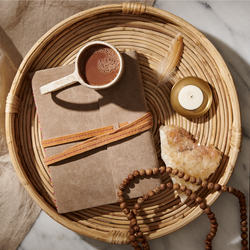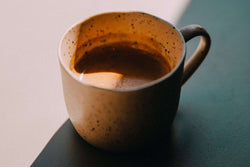Honoring Our Ancestors
With the fall in full swing, the leaves half gone, and the promise of winter to come drawing nearer, we are approaching a time of year when many cultures connect more intentionally with their ancestors. In the west we have Halloween. In Mexico, The Day of the Dead. In Celtic/Pagan traditions, there is Samhain. The list goes on, and for those of us who value the wisdom of long-standing traditions, there is something important for us in learning what it looks like to honor our ancestors.
When I first heard the term ‘ancestors’, it was often confusing to me and I wasn’t sure what people meant. What did it mean to have a relationship with my ancestors? Was it just in my mind? What if there was ancestral trauma that I was still working through? Did I need to have a particular belief system to do this?
Over time, as I got older, had my own kids, and saw the passing of 3 of my 4 grandparents, something started to take shape on a personal level that helped me understand the importance of tending to those who came before me. I realized that I still felt the presence of my grandparents who had passed and that in having kids, I had a greater responsibility to model how to treat our own elders & ancestors. To paraphrase author Stephen Jenkinson, how we treat our own ancestors is directly correlated with how we will be treated when our time comes to be ancestors to those to come. This personal level understanding gave me a new lens on the traditions of ancestor honoring and helped me connect with the inspiration they offer in terms of ways to put that into practice.
Whether we like it or not, we stand on the shoulders of all who come before us, and it is a matter of learning to accept all that we are in honoring them. We are literally the product of thousands of generations of successful parents, in so far as we were given the gift of life through that line so that we could be alive right now. For many, that comes with pain & trauma as well, and honoring our ancestors is as much about healing that as is about appreciating the people who gave rise to us.
And it is doesn’t have to be limited to our close blood relations. As we go back through the evolutionary chain of our own history, we realize that we are connected to all life. Some traditions view ancestors as all our relations, the earth and all her creatures that we transform into when we pass. Others celebrate the saints, sages and wisdom keepers that have passed on important lessons. Still others honor the force or energy that death is, and it’s relationship to life.
These practices can bring up deep feelings; of joy, grief, fear, anger and gratitude, among others. It’s important to acknowledge and give space to them all. In many ways, honoring our ancestors is a way to touch into these sacred emotions as they are the energies of life. In letting these feelings move through us, we are expressing our shared humanity and participation in the greater web of life, that ultimately will include our own death. To face that truth, regardless of what we believe happens after, is to humble ourselves and realize how we are not separate from life, but part of it’s on-going stream.
There are many ways to stay connected to our ancestors, however we conceive of that, but the common theme is proceeding as if they matter by not letting ourselves lose them. To lose them is a thing of the living. The dead are only lost if we do the losing. Those who came before us can be given a place at the table of our lives (or literally at our eating table) in many different ways, to keep them present in our lives.
Here are a few ideas on ways to practice honoring your ancestors:
Ancestor Altar
Set up a place in your home or your backyard that is a tribute to your ancestors. You can add pictures, objects from them, candles, incense, flowers or anything else that both reminds you of them, and also expresses your gratitude. You can spend some focused time there near or on Oct 31st/Nov 1st (the time usually celebrated), or also take a moment daily as you pass by the altar, in the time before and after.
Make sure to close the altar with care when it feels complete.
Ancestor Feast
There are a couple of variations on this practice of having food be the centerpiece of honoring our ancestors. It could be a harvest feast, using as many local ingredients from the abundance of this year’s harvest. It could be cooking traditional dishes to your ancestry or dishes passed down to you by your ancestors. It could be setting a literal place at your dinner table, complete with plate & food, for your ancestors to feast with you.
Storytelling
A beautiful way to honor our ancestors is in sharing stories about them, both that we know of their lives, or that we experienced with them. In this way, we keep them alive and remember their humanity. Doing this around a fire is particularly poignant. Our stories can be an offering themselves and help us connect with both our joy & grief.
Whatever you decide to do, it’s important for it to feel genuine and come from the heart. Like prayer, it’s not about the words or details, but about the feeling and the willingness to be humble in the face of the vastness of life. I highly recommend finding something that resonates with you, your particular ancestors (my paternal grandfather loved martini’s so I like to put some gin out for him), and your beliefs. This isn’t about learning to believe something new, but coming to see how much our present moment is shaped by our ancestors and from there, the gratitude that naturally wants to be expressed.







